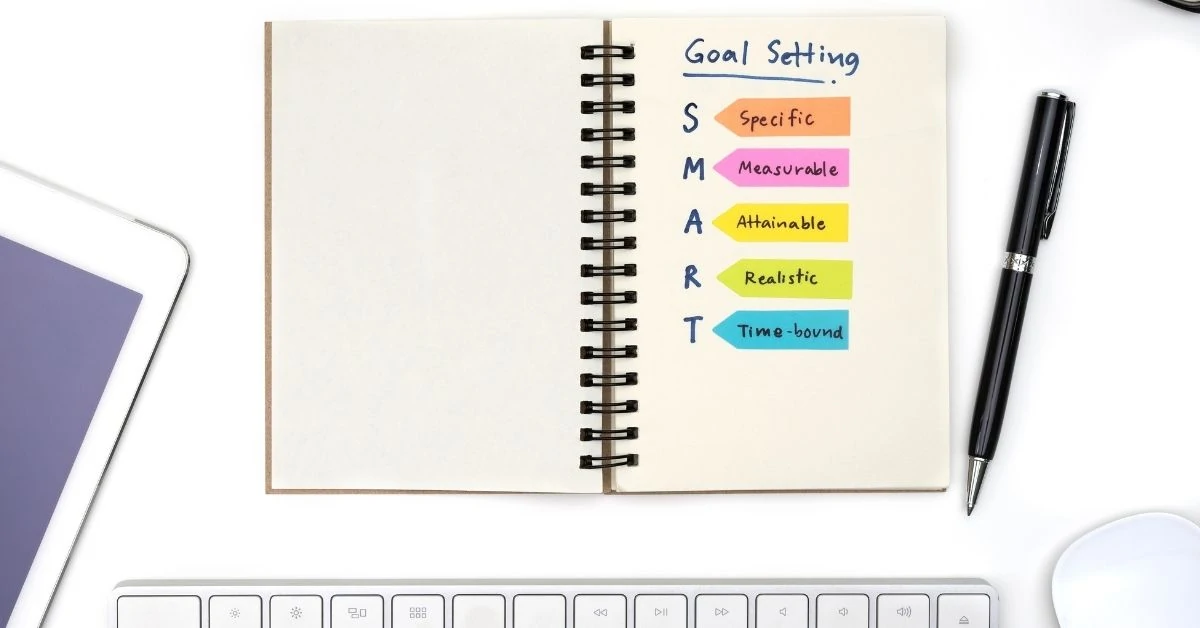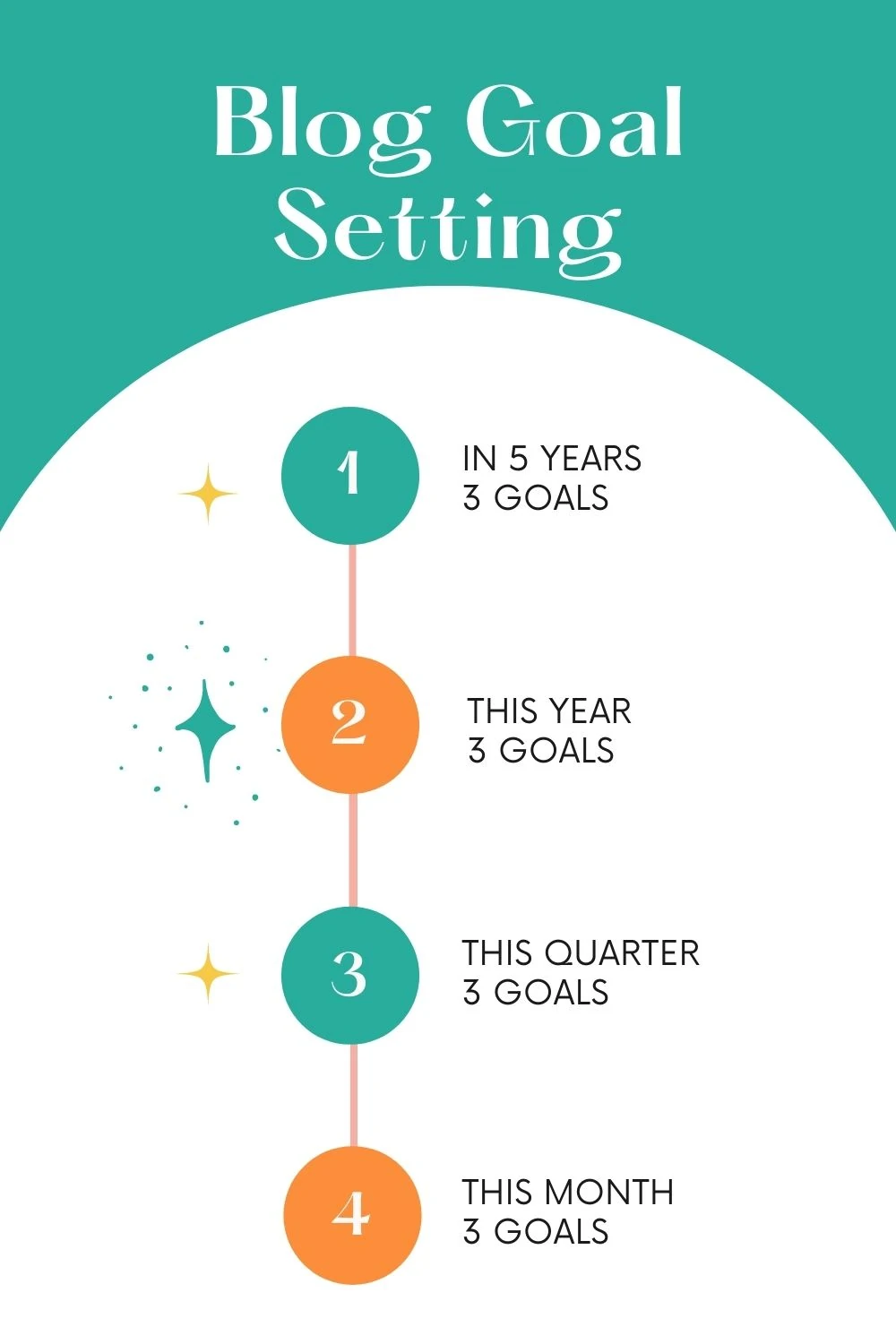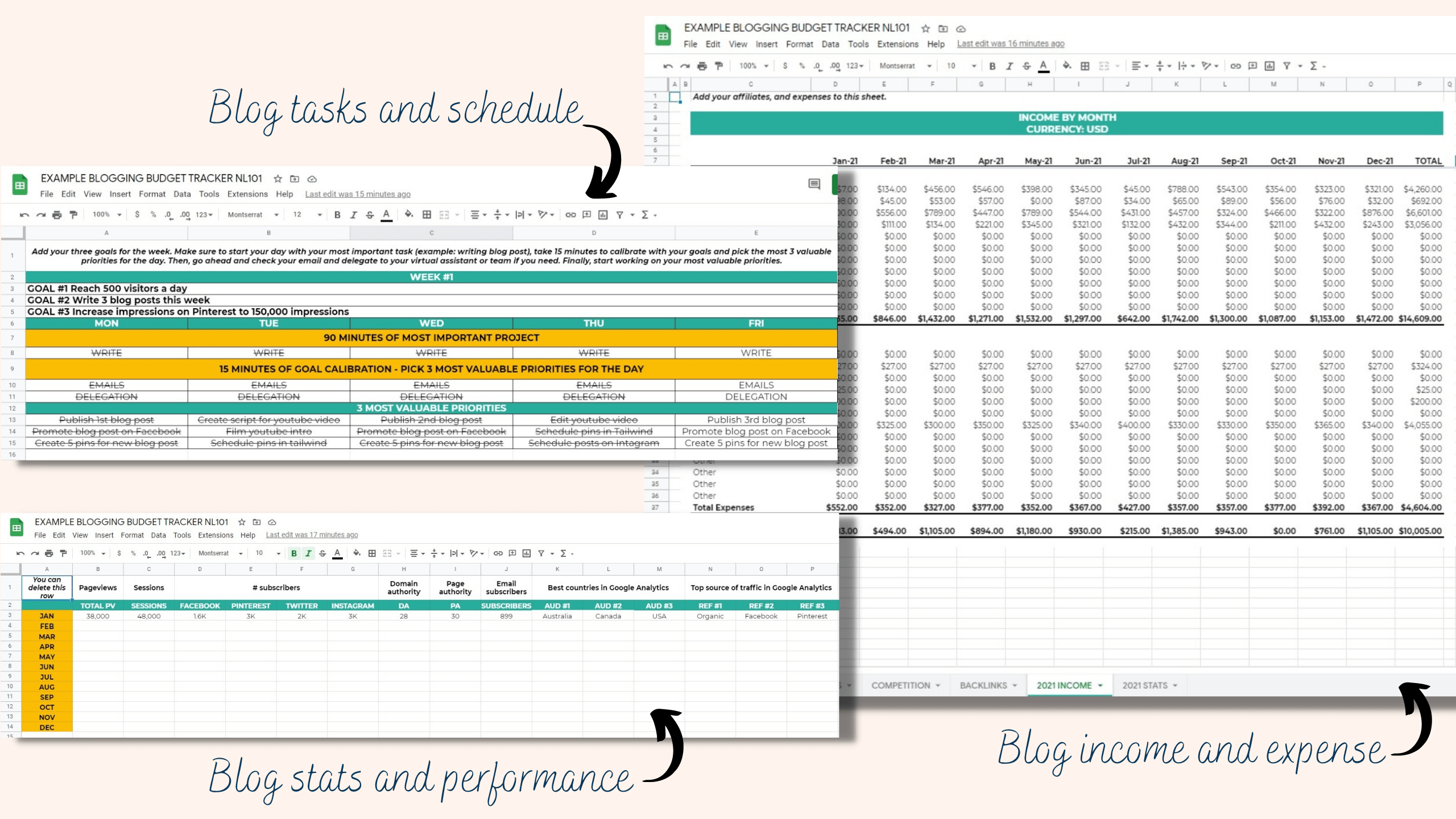Goal setting is a tactic that lots of entrepreneurs and athletes use. It gives them a long-term vision as well as motivation. Setting blogging goals is a great way to work on your vision, organize your time, and motivate yourself so you can work towards your achievement.
While most people love goals, some people just don’t – and that’s okay. You should use the techniques that work for you and if setting goals for your blog helps motivate you, you should do it.
I’m all about organization and goal setting. Everything I do (or try to do) has one focus – productivity.
In order to be productive, I set blogging goals. In this post, I’ll show you how to set realistic and measurable blog goals and I’ll suggest some methods I use myself to help you.
Before we start, let’s talk about the benefits of setting goals for your blog – especially for new bloggers.

Why Set Blogging Goals?
In order to reach where you want to be, you need to have a vision for the future. When thinking of the ideal outcomes, you can set blogging goals and a plan to reach them.
When you set a goal for your blog, you’re not only dreaming, you’re developing strategies and the motivation needed to achieve it.
Goal setting is effective because it gives you clarity and helps you prioritize.
It’s no secret – blogging is a lot of work and it comes with multiple tasks. If you don’t prioritize, you won’t be able to grow because you’ll get distracted with fun tasks that won’t make a difference in your business.
I started setting goals for my blog in the first year. Every month, I would write down my stats (traffic, social media, and other data I found to be important) so I could track my progress.
Even now, I do this on the 1st day of every month. It helps me focus and adjust my strategies.
Now, let’s see how you can set SMART goals for your blog.
How To Set Blog Goals?
First, let’s discuss what a SMART goal is because not all goals are good, or equal.
SMART goal setting is a framework that helps you set goals in the most effective way. Your blogging goal should be:
- Specific
- Measurable
- Achievable
- Relevant
- Time-bound
Let’s see some examples.
Specific Goal
For example, if your goal is to “grow your blog”, there are several ways to do so.
You want to grow your blog with subscribers.
You want to grow your blog traffic.
You want to be able to quit your job and blog full-time.✔️
Growing a blog can mean different things for different people. Why do you want to grow your blog? Be as specific as possible. If your dream goal is to quit your job to blog full-time, it’s more specific than just setting growing your blog as a goal.
Measurable Goal
For example, if your goal is to “write more”, there are several ways to do so.
You could write every day.
You could write once a week.
You could write 3000 words per week.✔️
Writing more is not measurable. Ideally, here you should target a number that you can easily measure. Whether it’s a number of blog posts or words to reach, make it measurable.
Achievable Goal
For example, if your goal is to “make money blogging”, there are several ways to do so.
Making $100,000 per year.
Making money every day.
Reach your first $100 per month.✔️
While you may be secretly dreaming of making $100,000 per year with your blog, you’ve got to start somewhere, and make that somewhere realistic. Your first goal should be to make your first affiliate sale, or to reach $100 per month. Then, you can grow the number as your blog grows and time passes.
Relevant Goal
For example, if your goal is to “grow your blog traffic”, there are several ways to do so.
Increase your page views.
Get readers daily.
Increase your organic traffic to 80%.✔️
How relevant is your goal? Growing your blog traffic is a cool goal, but for what exactly? If you want to get daily readers without having to write every day, perhaps your goal is to increase your organic traffic.
Time-Bound Goal
For example, if your goal is to “write more”, there are several ways to do so.
Write 3 blog posts.
Write more often.
You could write 3000 words by Friday.✔️
Using a time frame is important so you can hold yourself accountable. Writing more is simply not enough or writing 3 blog posts is too vague. After all, you could take two years to write these 3 blog posts if you don’t add a time-bound to it.
Now, if we add all the criteria together, we can come up with incredible SMART goals. Let’s see more examples.
Blogging Goal Examples
- Write 3 blog posts this week.
- Write down 10 blog post ideas today.
- Publish 6 blog posts this month.
- Increase blog traffic by 5% this month.
- Reach 10,000 monthly page views by the end of the quarter.
- Make 5 affiliate sales this month.
- Go through the first two modules of SEO from Scratch by the end of the month.
How To Stick To Your Blogging Goals
Now I’ll share my goal-setting method and ways to stick and follow through with your goals.
- Open a new Google Document. The title I gave to mine is “THE VISION”, but you can give it any name you like.
- Write down 3 goals that you can reach within 5 years. These goals can be related to your dreams, personal life, etc.
- Looking at these 3 goals, I come up with 3 smaller goals for this year. Obviously, they are kind of linked because, in order to achieve these bigger goals, I need to break them down in a realistic way.
- Looking at the 3 goals for this year, I come up with 3 goals for the quarter. While doing so, I write down ideas and strategies to reach these goals.
- Then, looking at the 3 goals for this quarter, I come up with 3 goals for this month. Again, I write down ideas and strategies to reach these goals.
- I repeat this process every month, quarter, and year.
- Every morning, as part of my work routine, I head to my work schedule spreadsheet and click on THE VISION so I can decide the three main tasks I need to do that day to get closer to my goals.
This work schedule spreadsheet is available as part of my blogging tracker template – a tool I use myself and that I created to help bloggers track their goals, blog performance, and income/expenses. You can grab it for $7.
This method works because every day, I’m reminded of where I’m heading and I’m taking the actions needed to reach my goals.
When the new month starts, I go through my monthly goals one by one, fill up my stats in my blogging tracker and plan for the new month.
Final Thoughts On Blogging Goals
Finally, goal setting for bloggers can be helpful and motivating. Knowing exactly where to put your energy means you won’t waste your precious time procrastinating.
I’ve tried different methods and systems over the years, and this one is the best for me so far, and I hope it’ll work for you too.
If you want to get the exact same system, grab your blogging tracker now.
Want to learn more about blogging? Read one of the following blog posts:




